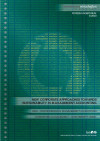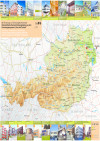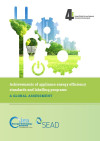Suchergebnisse
IEA Bioenergy ExCo Workshop - Technology advances in liquid biofuels and renewable gas
17. October 2022
TUtheSky, Getreidemarkt 9, 1060 Vienna
In conjunction with the IEA Bioenergy ExCo 90 Meeting international and national experts gathered to explore the advances being made in biofuels technologies, as well as technologies to produce renewable gas (biomass based), and discussed what is needed to accelerate their roll out to the market.
Oekosan 09 - International symposium for high-quality energetic renovation of large-scale buildings
From October 7 to 9, 2009 the AEE INTEC has organized an international symposium "Ökosan 09". The emphasis of the symposium was the communication of (partial) results of running and closed cooperation projects by leading technical experts dealing with the retrofit of large-scale buildings.
Practice Guide for Sustainable Building Sanitation and Modernisation within Construction Intents

A checklist considering priority, construction progress and actors is elaborated to serve a future-oriented selection of materials, energy carriers, design and construction within building sanitation, under a deliberate consideration of the involved actors from the construction branch
New Corporate Approaches Towards Sustainability In Management Accounting

EMA - Environmental Management Accounting Integrated Management - Cost-/Benefit Check
Forschungsforum
3/2003
Herausgeber: BMVIT
Englisch, 6 Seiten
Downloads zur Publikation
Stakeholder process of the initiative "Reference architecture for secure Smart Grids in Austria"
The project worked out the development of a smart grids reference architecture for Austria under involvement of all actors. Based on technological-scientific elements a process which met the requirements of stakeholders like operators of infrastructure, industry and also public agencies had been worked out to achieve nationally accepted and internationally orientated reference architecture.
Workshop: 48th International Energy Agency- Fluidised bed conversion (IEA-FBC) meeting
24. May 2004 -
25. May 2004
TU ViennaWien, AT
Workshop on "Future Challenges for Waste Combustion and Co-combustion in FBC"
Österreichische Demonstrationsgebäude aus dem Forschungsprogramm "Haus der Zukunft"

Österreichkarte mit Projektkurzbeschreibungen (Stand 2007)
Herausgeber: BMVIT
Mehrsprachig
Downloads zur Publikation
IEA-4E: Achievements of appliance energy efficiency standards and labelling programs

A global assessment (September 2015)
Herausgeber: IEA-4E
Englisch, 28 Seiten
Downloads zur Publikation
Know-How-Plus - Options and constraints of building renovation towards plus energy building standard
Aim of this research project is to identify the realizable reduction potential of energy consumption and CO2 emissions by refurbishment of the Austrian building stock towards plus energy building standard. Furthermore a construction-oriented manual will be supplied for interdisciplinary planning.
Development of a "Light Well" for daylight transparent, highly energy-efficient, multi-story buildings
Daylight supply of multi-story buildings with the help of rooflight openings. Reflecting vertical ducts transport light down to the lowermost floor. The idea promises new building structures with daylight transparency and high energy-efficiency that have a minimal demand of artificial light and cooling at optimal comfort.
Model Predictive Control of Thermally Active Building Systems and Monitoring of two Test-Boxes
A robust, predictive controller which utilises weather forecast data to control thermally active building systems had been designed, researched and assessed in terms of energy efficiency and comfort compared to standard controllers, especially for cooling purposes. Simulations and real measurements using two "Test-Boxes" with thermally active building systems which are constructed and built for this purpose were used to analyse energy efficiency and comfort. Low complexity and transparency of methods and solutions should allow for transferability of all results to guarantee maximum usability for similar applications.
Energy Plus House Weber - highest energy efficiency in the tension between tradition and modernity
The tension between tradition and modernity is shown and exemplarily solved on the example of the historic farmhouse "vulgo Weber". The object was converted into an energy plus house with an exceptionally holistic approach and also thought as a demonstration object for a broad public through the touristic use of the house.
Technology transfer for market introduction of multifunctional photovoltaic solar façade systems
Technology and know how transfer for market introduction of multifunctional photovoltaic solar façade systems. Constructional engineering, integration into the buildings´ energy system, economy. Design of an information website and accompanying target group work.
Raising efficiency by an optimized filters purification system using waste heat in metal industry
Purification and disposal of production effluents in waste water from metal manu¬fakturing processes is of economical and ecological importance for the Joh. Pengg AG. Econamical solutions for optimised purification of the filter textiles and the drying of the filter cake with waste heat have been found.
Urban wind energy - Development of methods for the assessment of small wind turbines in urban areas
The project "Urban wind energy" aims to create the basis for the assessment of roof-mounted small wind turbines (SWT) in urban areas. Therefore, methods for the characterisation of turbulent wind flow fields are developed and on the other hand the impacts of turbulent wind conditions with reference to selected turbulence indicators on the performance of small wind turbines are investigated. The overall aim of the project is to address the question how to evaluate sites in urban areas for the application of small wind turbines.
Ecologically friendly resin impregnation of rotating machines with the use of the joule effect
Windings of rotating machines or electrical generators (e. g. wind and water power generators) are impregnated with resin. A new technology using the heating effect of current is investigated. The high efficiency of heating with the joule effect results in quick heating of stator leading to fast gelling of the resin, which implies low emission.
Organisation and initiation of a multfunctional energy - centre in the community Deutschlandberg
Conception and implementation of a multfunctional energy - centre considering as exemple "Model Güssing", where different possibilities concerning the production- and consumerside are optimised together in order to achieve the aim of an energy - self-sustaining community Deutschlandsberg.
monitorPlus. Monitoring of pilot projects of the Austrian RTD-program Building of Tomorrow Plus
All pilot projects of "Building of Tomorrow Plus" had to be evaluated in a common monitoring project on energy efficiency, user's acceptance, and the integrated building performance. monitorPlus documented and assessed the results of this evaluation.
ECODESIGN-Toolbox for Green Product Concepts - Method development for sustainable product design
The objective of the project is the method development for sustainable product design in close cooperation with industrial partners. The ECODESIGN Toolbox for Green Product Concepts - a six step approach has been developed here.
Development of a Performance- and Risk-Management-Concept for Sustainable Supply Chain Networks
The target of this project is to develop a specific performance and risk-management concept for companies in sustainable supply chain networks. By using this concept the involved companies will be able to reduce various risks and have more success with sustainable development.
